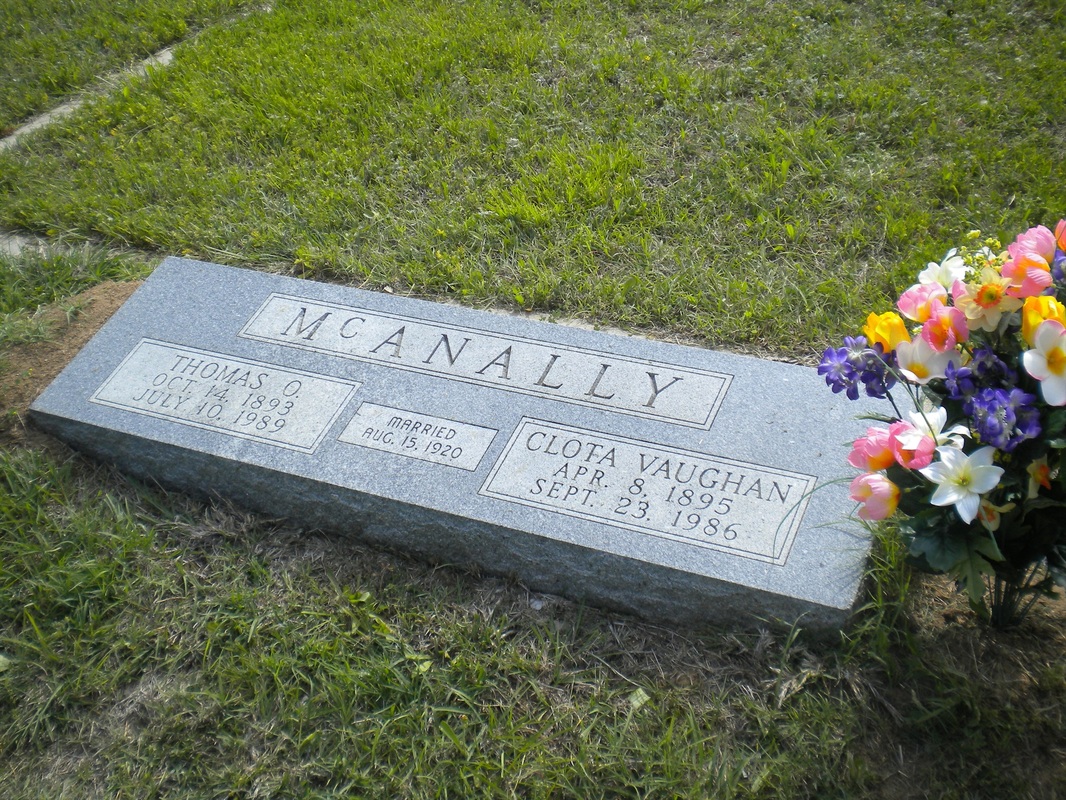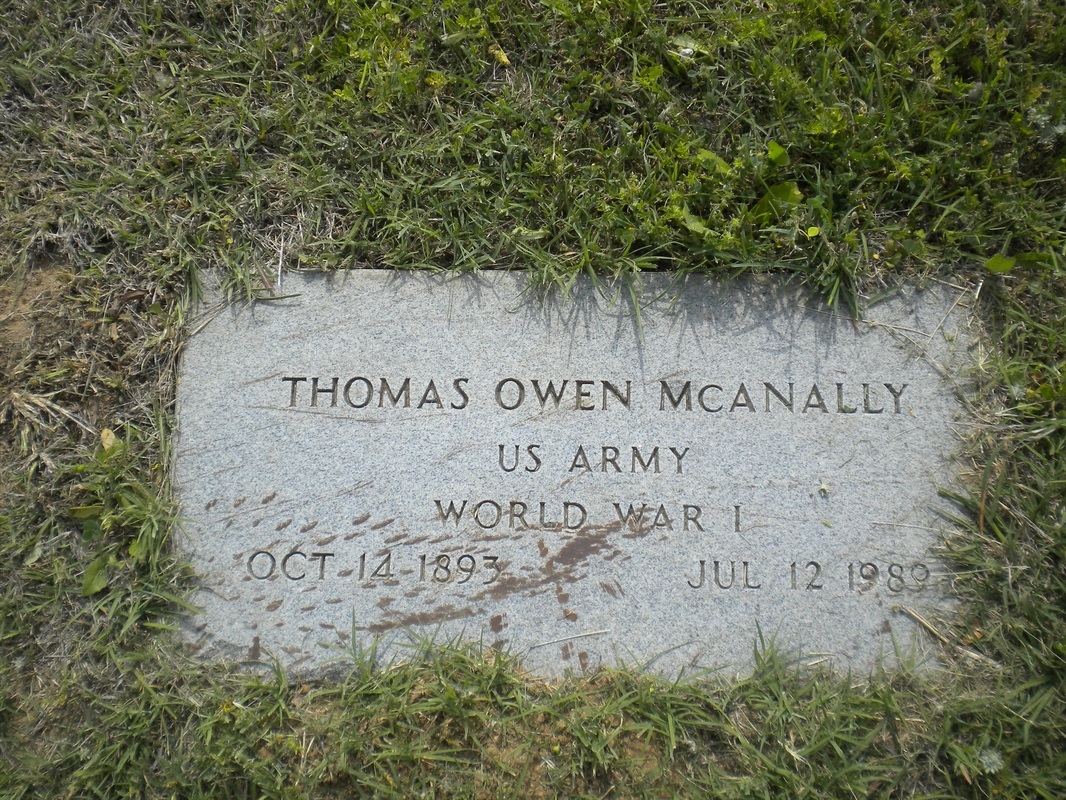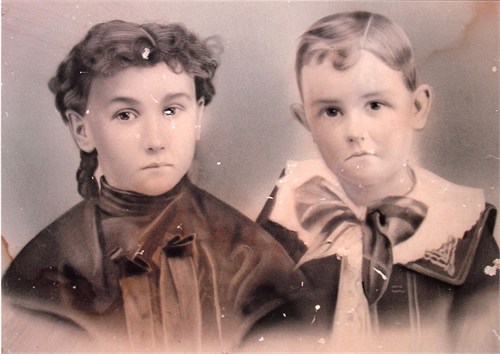THOMAS OWEN McANALLY
Birth: 14 Oct 1893
Death: 10 Jul 1989
(age 95 years, 8 months, 26 days)
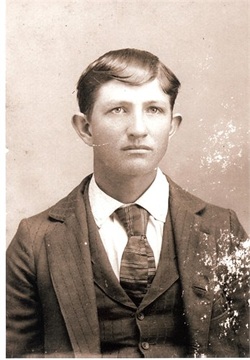
Tom
_McAnally has experienced Indian raids, boll weevils
Thomas Owen McAnally of the Upper Denton Road is fast approaching 95, but his outlook on life and sense of humor are much younger.
Born in the Veal Station Community on October 14, 1893, he was the second of four children for John Roger McAnally and Margaret Samantha Kutch. His father came from Tennessee: his mother was a native Parker Countian. Tom’s birthplace was one half mile from where he now lives.
He began his formal education at Veal Station, then continued it at Union School (afterwards called Wright), which was located where the Friendship Baptist Church now stands. “The school was on the West side of the creek (Clear Fork) at first,” he said. “Then they moved it to the East side. There was no playground equipment, just some big Post Oak trees and a lot of sand.”
For a time after he got out of school, he worked for the Railway Mail Service. His first route was from Sweetwater to Big Spring; his next from Chickasha, Oklahoma to “some where in Kansas”.
In 1918 Tom was drafted into the Army. He was stationed at San Antonio for 30 days, then sent to Macon, Georgia, where he received most of his training. Long Island, New York was his next address. He missed overseas duty, since he was in the hospital with the flu when his unit shipped out. “I was very disappointed at being left behind,” he remembers. “All my friends went.
Thomas Owen McAnally of the Upper Denton Road is fast approaching 95, but his outlook on life and sense of humor are much younger.
Born in the Veal Station Community on October 14, 1893, he was the second of four children for John Roger McAnally and Margaret Samantha Kutch. His father came from Tennessee: his mother was a native Parker Countian. Tom’s birthplace was one half mile from where he now lives.
He began his formal education at Veal Station, then continued it at Union School (afterwards called Wright), which was located where the Friendship Baptist Church now stands. “The school was on the West side of the creek (Clear Fork) at first,” he said. “Then they moved it to the East side. There was no playground equipment, just some big Post Oak trees and a lot of sand.”
For a time after he got out of school, he worked for the Railway Mail Service. His first route was from Sweetwater to Big Spring; his next from Chickasha, Oklahoma to “some where in Kansas”.
In 1918 Tom was drafted into the Army. He was stationed at San Antonio for 30 days, then sent to Macon, Georgia, where he received most of his training. Long Island, New York was his next address. He missed overseas duty, since he was in the hospital with the flu when his unit shipped out. “I was very disappointed at being left behind,” he remembers. “All my friends went.
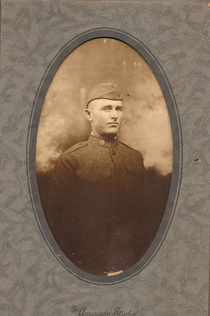 Tom McAnally
Tom McAnally
When he had recovered sufficiently, he was assigned to the 31st Division, 62nd Battalion, 124 Infantry, which was called the “Double-time Outfit.” Some of his outfit were sent overseas after Armistice to handle discharges. Guess who didn’t get to go – Tom. He had the mumps.
He was discharged in 1919 at Fort Lee, Virginia.
On August 15, 1920, Tom married his former schoolmate, Clota Vaughan, at her home in Arlington. For years she taught in Parker County Schools.
Tom was back on the farm at the time of their marriage. “Before we got married, I planted a big cotton crop, intending to use the money to marry and set up housekeeping. Boll weevils had other plans for my cotton. I was expecting about 20 bales from that crop, but only made half a bale.
He had better luck with his wheat the year he bought his first car, a 1916 Maxwell, for $670. “We made 50 to 80 bushels per acre,” he remembers, “and prices were good. My wheat was sold for $3.20 per bushel and I paid for my car. Tires weren’t much in those days. You could very rarely get where you were going, no matter how short the distance, without stopping to patch one or more tires.”
He’d haul 3,000 pounds (55 bushels) of wheat in his new wagon pulled by four mules or horses to the Crystal Palace Mills on the East side of North Main. “Two could have pulled it if the road had been decent, but it wasn’t. It was just a trail full of chugholes.”
After unloading his wheat, he’d take his team to the wagon yard, feed them, and head home. That night he’d load up again, to be ready for an early start in Weatherford the next morning.
He talks about the Indian raids when his mother was a small child, and how she and her brother were put on ponies in Jacksboro to ride to Weatherford to escape them when she was only two. When her family moved to Weatherford, they discovered a pony that the Indians had left on their place. They named him “Choctaw.”
Tom and Clota had three children; Jean (Morris), Roger, and Charles. All live in the Weatherford area.
The McAnally’s had been married sixty-six years when Clota died in 1986.
Until recently, when he quit driving in traffic, his favorite pastime was attending purebred hog shows. “I miss that. I still drive a little, where there is very little traffic.”
Hog shows are not all he misses. “I’d like to be out working with the stock and driving the tractor,” he said with a trace of sadness, “but they (his kids and the doctor) won’t let me.”
He was discharged in 1919 at Fort Lee, Virginia.
On August 15, 1920, Tom married his former schoolmate, Clota Vaughan, at her home in Arlington. For years she taught in Parker County Schools.
Tom was back on the farm at the time of their marriage. “Before we got married, I planted a big cotton crop, intending to use the money to marry and set up housekeeping. Boll weevils had other plans for my cotton. I was expecting about 20 bales from that crop, but only made half a bale.
He had better luck with his wheat the year he bought his first car, a 1916 Maxwell, for $670. “We made 50 to 80 bushels per acre,” he remembers, “and prices were good. My wheat was sold for $3.20 per bushel and I paid for my car. Tires weren’t much in those days. You could very rarely get where you were going, no matter how short the distance, without stopping to patch one or more tires.”
He’d haul 3,000 pounds (55 bushels) of wheat in his new wagon pulled by four mules or horses to the Crystal Palace Mills on the East side of North Main. “Two could have pulled it if the road had been decent, but it wasn’t. It was just a trail full of chugholes.”
After unloading his wheat, he’d take his team to the wagon yard, feed them, and head home. That night he’d load up again, to be ready for an early start in Weatherford the next morning.
He talks about the Indian raids when his mother was a small child, and how she and her brother were put on ponies in Jacksboro to ride to Weatherford to escape them when she was only two. When her family moved to Weatherford, they discovered a pony that the Indians had left on their place. They named him “Choctaw.”
Tom and Clota had three children; Jean (Morris), Roger, and Charles. All live in the Weatherford area.
The McAnally’s had been married sixty-six years when Clota died in 1986.
Until recently, when he quit driving in traffic, his favorite pastime was attending purebred hog shows. “I miss that. I still drive a little, where there is very little traffic.”
Hog shows are not all he misses. “I’d like to be out working with the stock and driving the tractor,” he said with a trace of sadness, “but they (his kids and the doctor) won’t let me.”
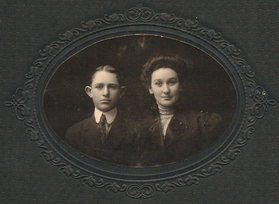 siblings Tom and Jessie
siblings Tom and Jessie
Farming has been his life. “I’ve been on this same place most of the time since 1896,” he recalled.
Tom has a full head of white hair and walks straight and tall. Glasses are tucked into the pocket of his shirt, to be used “only when I read.”
About as self-sufficient as he dares to be without stiff opposition from those who love him, Tom does his own grocery shopping (after letting one of the kids drive him) and house keeping – “Such as it is.”
Except for Sunday meals with his children, he does his own cooking. “I can fix some things,” he said, “but I’m not good at it. My mother was a good cook; my wife was an excellent cook; but somehow I never quite got the hang of it.” You won’t catch him warming a TV dinner, however. He cooks having a sweet tooth. “If it has sugar in it, I like it, especially anything called pie."
Tom has a full head of white hair and walks straight and tall. Glasses are tucked into the pocket of his shirt, to be used “only when I read.”
About as self-sufficient as he dares to be without stiff opposition from those who love him, Tom does his own grocery shopping (after letting one of the kids drive him) and house keeping – “Such as it is.”
Except for Sunday meals with his children, he does his own cooking. “I can fix some things,” he said, “but I’m not good at it. My mother was a good cook; my wife was an excellent cook; but somehow I never quite got the hang of it.” You won’t catch him warming a TV dinner, however. He cooks having a sweet tooth. “If it has sugar in it, I like it, especially anything called pie."
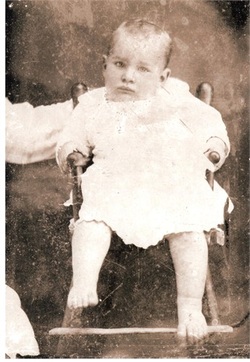 Tom as a baby
Tom as a baby
He talked about his house, which was built in 1867. There have been only three property changes, all in the family. It was first deeded to John Godfrey in 1857 by Governor Peace, then to J. R McAnally, later to T. O. McAnally. “The original house is framed with logs,” Tom said, “with rock inside that, which was covered with a thick coat of limestone. In 1900, my father built on two more rooms. Later we bricked the whole outside.”
“The beams and lumber for the original two rooms were hauled by ox team from Houston. The man who hauled the lumber had taken a load of cotton down there in the fall to sell. He found no market, so he traded for lumber to build a house. He had to wait until spring to return so that his team would have grazing along the way home. At the end of the five-month trip, he learned that his wife had been dead four months. His house never got built from scratch, but John W.Godfrey bought the lumber from him and built one.”
Tom attended Godfrey’s Chapel Church for many years until memberships dwindled to three or four families, at which time they all came to Couts Memorial Methodist. Because of a hearing problem, he now attends church in front of his TV.
“I don’t watch much TV,” he said. “There’s little on I care about. Besides preaching. I like to watch the news.”
“I read a lot, mostly my Bible and Sunday School quarterlies. And the newspaper.”
In summer, he enjoys the prairie breezes. “There’s hardly ever a night that I don’t have to use cover.”
Tom has nine grandchildren and five great grandchildren, who enjoy hearing about his past. Sometimes the young ones will challenge him on a point by saying, “Papa you just forgot.”
“But they can’t prove it,” he said with a grin on his face.
Article from the Weatherford Democrat (6 Sep 1988)
Photos of Tom Courtesy of Kimberly Woody Boretsky
“The beams and lumber for the original two rooms were hauled by ox team from Houston. The man who hauled the lumber had taken a load of cotton down there in the fall to sell. He found no market, so he traded for lumber to build a house. He had to wait until spring to return so that his team would have grazing along the way home. At the end of the five-month trip, he learned that his wife had been dead four months. His house never got built from scratch, but John W.Godfrey bought the lumber from him and built one.”
Tom attended Godfrey’s Chapel Church for many years until memberships dwindled to three or four families, at which time they all came to Couts Memorial Methodist. Because of a hearing problem, he now attends church in front of his TV.
“I don’t watch much TV,” he said. “There’s little on I care about. Besides preaching. I like to watch the news.”
“I read a lot, mostly my Bible and Sunday School quarterlies. And the newspaper.”
In summer, he enjoys the prairie breezes. “There’s hardly ever a night that I don’t have to use cover.”
Tom has nine grandchildren and five great grandchildren, who enjoy hearing about his past. Sometimes the young ones will challenge him on a point by saying, “Papa you just forgot.”
“But they can’t prove it,” he said with a grin on his face.
Article from the Weatherford Democrat (6 Sep 1988)
Photos of Tom Courtesy of Kimberly Woody Boretsky
Photo courtesy of Dave Cumming
